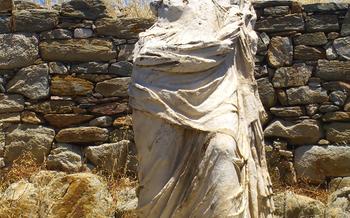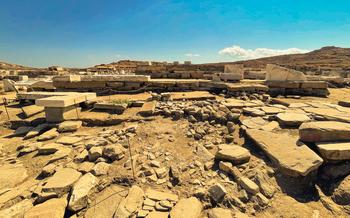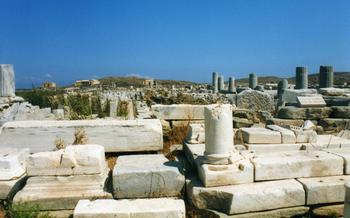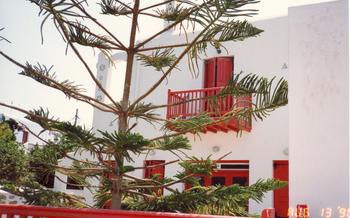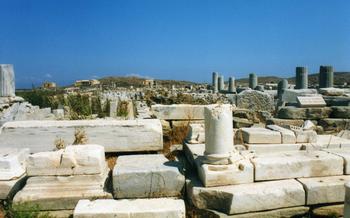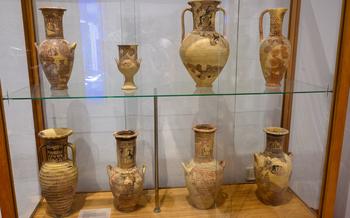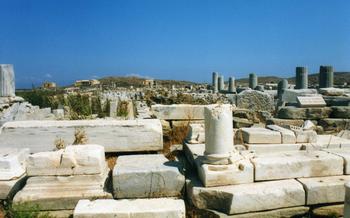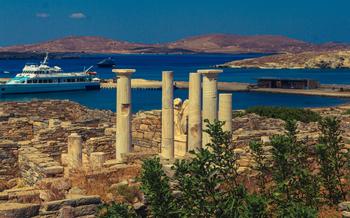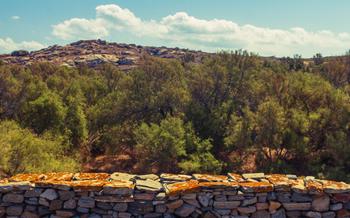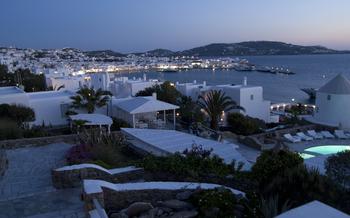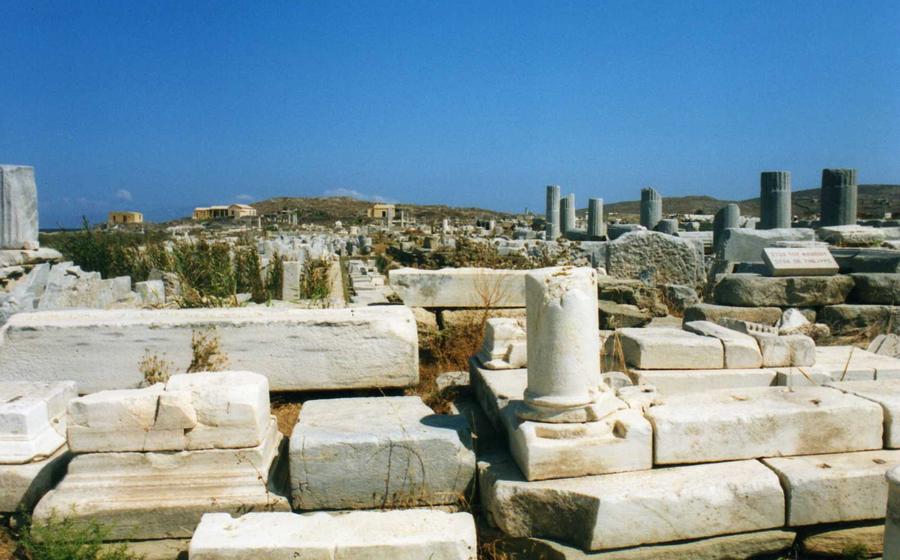
House of the Dolphins at Delos
- Delos: An Ancient Wonder
- Location and Transportation
- The House of the Dolphins
- Exploring the House of the Dolphins
- Other Notable Sites on Delos
- Archaeological Excavations
- Tips for Visitors: Making the Most of Your Delos Experience
- Delos Museum: Unveiling the Treasures of the Sacred Island
- Guided Tours: Unveiling the Secrets of Delos
- Photography and Videography
- Accessibility
- Local Cuisine
- Combining Delos with Other Islands
- Insider Tip: Unveiling Delos' Hidden Gem
Delos: An Ancient Wonder
Delos, a small uninhabited island in the Cyclades archipelago, holds significant historical and archaeological importance. Declared a UNESCO World Heritage Site in 1990, Delos was once a sacred island in ancient Greece, revered as the birthplace of the twin gods Apollo and Artemis. It served as a major religious centre and a thriving port city, connecting the Aegean Sea with the rest of the ancient world. Home to numerous well-preserved ruins and artefacts, Delos offers a glimpse into the grandeur and complexity of ancient Greek civilisation, making it a must-visit destination for history buffs and archaeology enthusiasts.
Location and Transportation
Delos is a small, uninhabited island located in the heart of the Cyclades archipelago, a group of islands renowned for their stunning beauty and rich history. It is situated just a stone's throw away from the vibrant island of Mykonos, making it an ideal day trip destination. Ferries depart regularly from Mykonos Town, with the journey taking approximately 30-45 minutes. The cost of a round-trip ticket is around €20-€25, offering a convenient and affordable way to reach this ancient wonder. For those seeking a more personalised experience, organised tours from Mykonos to Delos are also available, providing transportation, guided tours, and insights into the island's history and significance.
The House of the Dolphins
The House of the Dolphins is one of the most captivating and well-preserved private residences on Delos. Constructed in the 2nd century BC, it belonged to a wealthy merchant named Dionysos, and its name derives from the stunning mosaic floor that adorns its main room. The mosaic, created using thousands of tiny coloured pebbles, depicts a playful group of dolphins frolicking in the waves, surrounded by intricate geometric patterns. It is considered a masterpiece of Hellenistic art and offers a glimpse into the luxurious lifestyle of Delos' elite during antiquity.
The house itself is a testament to the architectural prowess of the ancient Greeks. Built around a central courtyard, it features elegant Doric columns, graceful arches, and intricate frescoes on the walls. The various rooms, including bedrooms, dining areas, and a kitchen, are arranged around the courtyard, providing a glimpse into the daily life and activities of its ancient inhabitants. The House of the Dolphins serves as a reminder of the vibrant and sophisticated society that once flourished on Delos.
Exploring the House of the Dolphins
Step into the House of the Dolphins and embark on a journey through time. As you wander through the well-preserved rooms, admire the intricate frescoes and artwork adorning the walls. These vibrant paintings offer a glimpse into the lives and beliefs of the ancient inhabitants.
In the main hall, marvel at the stunning mosaic floor that depicts a pod of dolphins swimming gracefully amidst waves. The dolphins, revered in ancient Greek culture as symbols of joy, protection, and transformation, lend the house its name.
Each room in the house serves a different purpose, offering insights into the daily life of its occupants. The kitchen, with its preserved cooking utensils and storage jars, provides a glimpse into the culinary practices of the time. The bedrooms, with their simple yet elegant furnishings, evoke a sense of intimacy and domesticity.
As you explore further, discover the private chambers and reception rooms, where the owners of the house entertained guests and conducted business. The intricate designs and decorative elements in these rooms reflect the wealth and status of the family.
Pay attention to the architectural features of the house, such as the use of columns, arches, and skylights. These elements not only add to the aesthetic appeal of the building but also demonstrate the advanced construction techniques employed by the ancient Greeks.
The House of the Dolphins is a testament to the artistry, craftsmanship, and ingenuity of the ancient Greeks. As you walk through its rooms, imagine the laughter, conversations, and daily routines that once filled these spaces. Let the house transport you back in time and experience the vibrant energy of this ancient city.
Other Notable Sites on Delos
Beyond the House of the Dolphins, Delos is home to a wealth of other significant landmarks and ruins that offer a glimpse into its rich past. Visitors should not miss the Terrace of the Lions, where a row of imposing marble lions once guarded the sacred precinct of Apollo. The Temple of Apollo, with its Doric columns and impressive size, stands as a testament to the god's prominence on the island. The Agora, the ancient marketplace, provides a glimpse into the bustling commercial activities that once took place on Delos.
To make the most of your visit, plan a route or itinerary that allows you to efficiently explore these attractions. Start at the House of the Dolphins and then proceed to the Terrace of the Lions, which is just a short walk away. From there, head to the Temple of Apollo, located in the heart of the archaeological site. Finally, visit the Agora, which is situated near the harbour. This route will ensure that you cover the most important landmarks of Delos without missing any of its hidden treasures.
Archaeological Excavations
Delos has been the subject of extensive archaeological excavations since the 19th century, revealing a wealth of ancient treasures and providing invaluable insights into the island's rich past. French archaeologist Charles Lenormant conducted the initial excavations in 1873, followed by a team from the French School at Athens under the direction of Maurice Holleaux in 189These early excavations unearthed significant structures and artefacts, including the Terrace of the Lions, the Temple of Apollo, and the Agora.
In the 20th century, excavations were continued by the Greek Archaeological Service, leading to the discovery of numerous houses, temples, and public buildings. One of the most significant finds was the House of the Dolphins, which yielded a stunning mosaic floor depicting dolphins and other marine creatures. Other notable discoveries include sculptures, pottery, inscriptions, and jewellery, which shed light on the daily lives and customs of the ancient Delians.
Ongoing research and conservation efforts are aimed at preserving Delos' archaeological heritage and ensuring its accessibility to future generations. The Delos Museum, located on the island, houses many of the artefacts and treasures excavated from the site, providing visitors with a deeper understanding of Delos' history and culture.
Tips for Visitors: Making the Most of Your Delos Experience
To make the most of your visit to Delos, consider these practical tips:
-
Best time to visit: Aim to visit Delos during the shoulder seasons (April-May and September-October) to avoid the summer crowds and enjoy more pleasant weather.
-
Appropriate attire: Dress comfortably and wear sturdy, closed-toe shoes suitable for walking on uneven terrain. Remember that Delos is an archaeological site, so respect the environment by avoiding revealing or inappropriate clothing.
-
Sun protection: The Greek sun can be intense, so protect yourself with sunscreen, a hat, and sunglasses. Bring a water bottle to stay hydrated, especially during the warmer months.
-
Photography and videography: Photography is generally allowed at Delos, but using a tripod or other professional equipment may require a permit. Respect the site's regulations and avoid using flash photography, as it can damage the ancient artefacts.
-
Be respectful: Remember that Delos is a UNESCO World Heritage Site and a place of historical significance. Be respectful of the ruins and artefacts, and avoid touching or climbing on them.
Delos Museum: Unveiling the Treasures of the Sacred Island
Housed on the sacred island of Delos, the Delos Museum stands as a testament to the island's rich history and cultural significance. Within its walls, visitors embark on a journey through time, discovering the treasures unearthed from the extensive archaeological excavations conducted on the site.
The museum's collection is a testament to the island's vibrant past, showcasing a diverse array of artefacts that tell the story of Delos' rise and fall. From exquisite sculptures and intricate pottery to finely crafted jewellery and everyday objects, each piece offers a glimpse into the lives of the ancient inhabitants and the island's pivotal role in the ancient world.
Among the highlights of the collection are the iconic marble statues of lions, once majestically guarding the Terrace of the Lions. The delicate craftsmanship and lifelike expressions of these sculptures captivate visitors, transporting them back to a time when Delos was a thriving centre of worship and trade.
The museum also houses an impressive collection of pottery, ranging from humble household vessels to intricately painted amphorae. These artefacts provide insights into the daily lives of the Delians, their culinary practices, and their trade relations with far-flung corners of the Mediterranean.
For those seeking to delve deeper into the history and mythology of Delos, the museum's collection of inscriptions offers a wealth of information. Engraved on stone tablets and fragments, these inscriptions record religious decrees, financial transactions, and even personal letters, shedding light on the intricate workings of the ancient city-state.
A visit to the Delos Museum is an essential complement to exploring the archaeological site itself. Here, visitors can trace the evolution of Delos from a humble fishing village to a bustling port city and a revered religious sanctuary. The museum's collection provides a tangible connection to the past, allowing visitors to gain a deeper understanding of the rich cultural heritage that shaped this sacred island.
Guided Tours: Unveiling the Secrets of Delos
Enhance your visit to Delos by joining a guided tour, a fantastic way to delve deeper into the island's rich history, mythology, and archaeology. Knowledgeable and experienced guides bring the site to life, sharing captivating stories and insights that you might miss if exploring independently. Guided tours typically cover the major attractions of Delos, including the House of the Dolphins, the Terrace of the Lions, and the Temple of Apollo.
Booking a guided tour in advance is recommended, especially during the peak tourist season, to secure your spot and avoid disappointment. Several tour operators in Mykonos offer guided tours to Delos, ranging from half-day to full-day excursions. Choose a tour that fits your interests and schedule, and be sure to check the itinerary and inclusions before booking.
For those who prefer a self-guided experience, audio guides are available for rent at the Delos Museum. These audio guides provide informative commentary and explanations as you explore the site at your own pace. With or without a guide, Delos offers a captivating journey through the past, allowing you to connect with the ancient world and discover its many wonders.
Photography and Videography
Photography and videography enthusiasts are welcome to capture the beauty and essence of Delos through their lenses. However, it's important to be mindful of the site's regulations. Professional photography or filming for commercial purposes requires a permit from the Greek Ministry of Culture. Visitors are encouraged to respect the site's preservation and refrain from using flash photography or drones.
To make the most of your photographic journey, consider using a tripod for stability and experiment with different angles to capture unique perspectives. Early morning or late afternoon light often provides the most favourable conditions for stunning shots. Share your Delos experiences with the world through your photographs and videos, while adhering to the site's guidelines and preserving its legacy for future generations.
Accessibility
Delos welcomes visitors with disabilities, ensuring an inclusive experience for all. Wheelchair accessibility is well-addressed, with designated pathways and ramps throughout the archaeological site. Visitors with limited mobility can explore the site using alternative means, such as electric carts or wheelchairs, which can be rented on-site. The friendly and accommodating staff at Delos are always willing to assist visitors with special needs, providing guidance and directions to make their visit as comfortable and enjoyable as possible. Delos stands as an exemplary destination for all travellers, promoting inclusivity and ensuring that everyone can appreciate the wonders of this ancient island.
Local Cuisine
A visit to Greece is not complete without savouring the delectable local cuisine. While in Mykonos, take the opportunity to indulge in traditional Greek dishes that showcase the region's rich culinary heritage. Must-try dishes include moussaka, a hearty eggplant and potato casserole topped with a creamy béchamel sauce; souvlaki, succulent grilled meat skewers; and gyros, a popular street food featuring pita bread stuffed with grilled meat, tomatoes, onions, and tzatziki sauce.
For an authentic dining experience, venture into Mykonos Town and explore the charming tavernas and restaurants that line the narrow streets. Here, you can savour the freshest seafood, including grilled octopus, calamari, and lobster, accompanied by traditional Greek salads and dips. Don't miss the opportunity to try local cheeses, such as feta and mizithra, and sample the delicious pastries and sweets, such as baklava and loukoumades.
As you dine, embrace the warm hospitality and lively atmosphere that characterise Greek tavernas. Engage with the friendly locals, enjoy the traditional music, and let the flavours of Mykonos transport you to a world of culinary delight.
Combining Delos with Other Islands
Delos' proximity to other captivating islands in the Cyclades archipelago presents an alluring opportunity for island hopping. Santorini, renowned for its stunning sunsets and dramatic caldera views, is a mere ferry ride away. Paros, with its pristine beaches, picturesque villages, and vibrant nightlife, offers a contrasting yet equally enchanting experience.
Island hopping allows you to tailor your trip to your interests and preferences. Whether you seek relaxation on sun-kissed shores, exploration of ancient ruins, or indulgence in vibrant nightlife, the Cyclades has something for every traveller.
Ferries between the islands operate frequently, providing a seamless and convenient mode of transport. Embrace the flexibility of island hopping and create a unique itinerary that combines the historical charm of Delos with the diverse attractions of Santorini, Paros, and beyond.
Each island in the Cyclades boasts its own distinct character and allure. Discover hidden gems, immerse yourself in local culture, and create lasting memories as you traverse this enchanting archipelago.
Insider Tip: Unveiling Delos' Hidden Gem
Beyond the renowned attractions of Delos, there lies a hidden gem waiting to be discovered. Venture off the beaten path and seek out the ancient theatre, nestled amidst the ruins. This secluded spot offers a unique perspective on Delos' past, transporting you back to a time when tragedies and comedies echoed through the stone seats. Imagine the vibrant atmosphere as performers graced the stage, captivating audiences under the vast expanse of the Greek sky. As you sit in the ancient theatre, let your imagination soar, and feel the spirit of Delos come alive once more.
